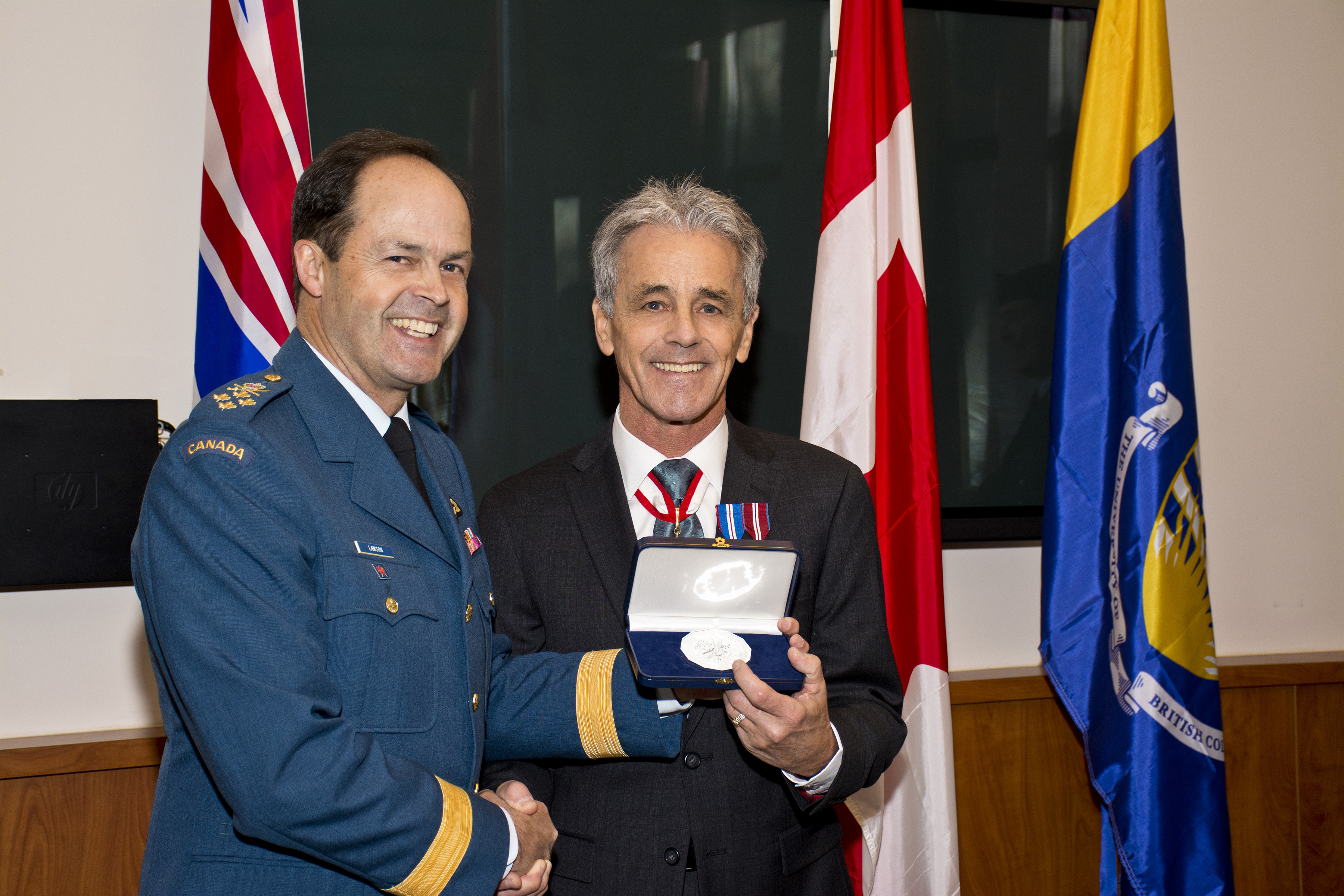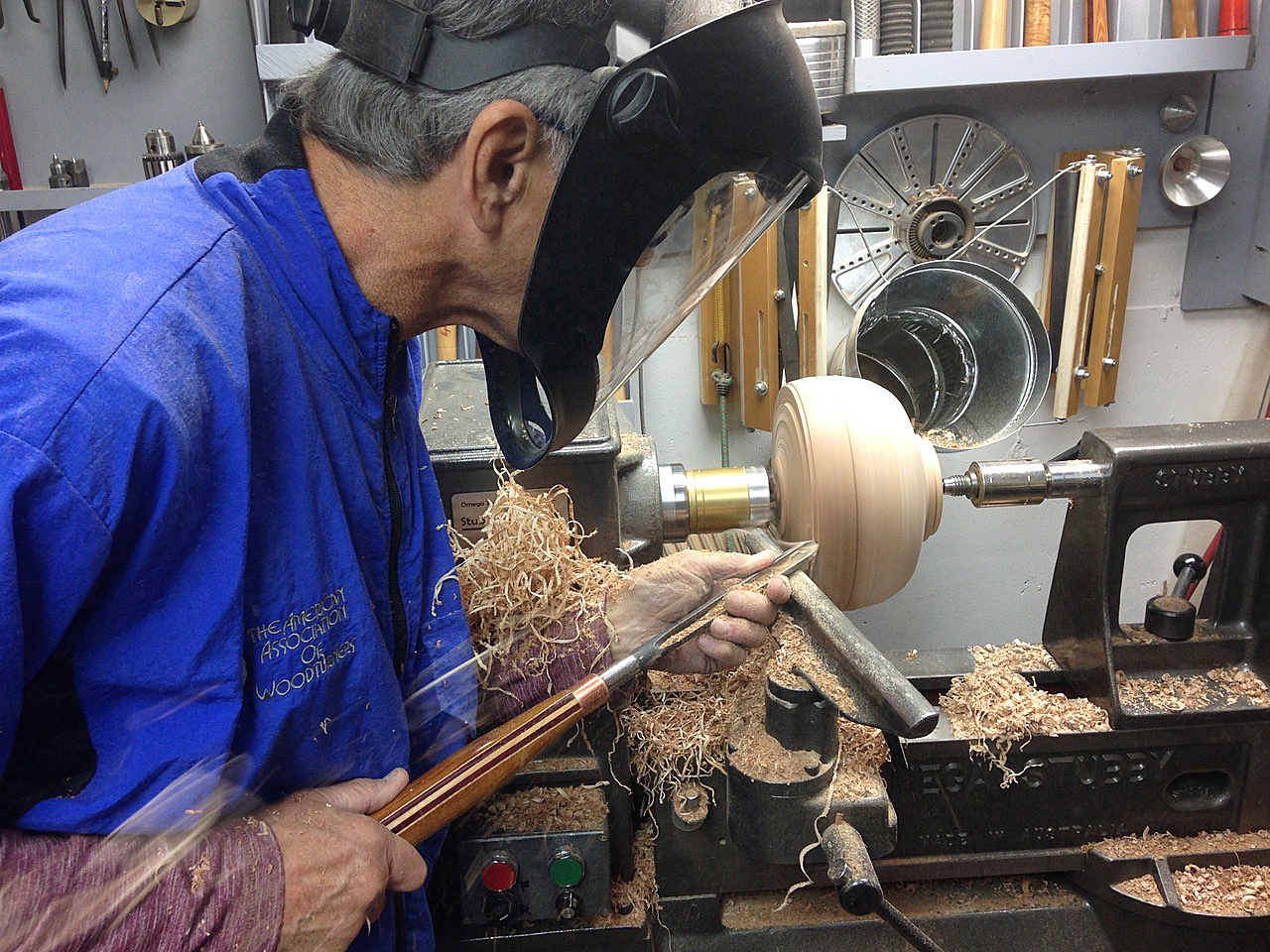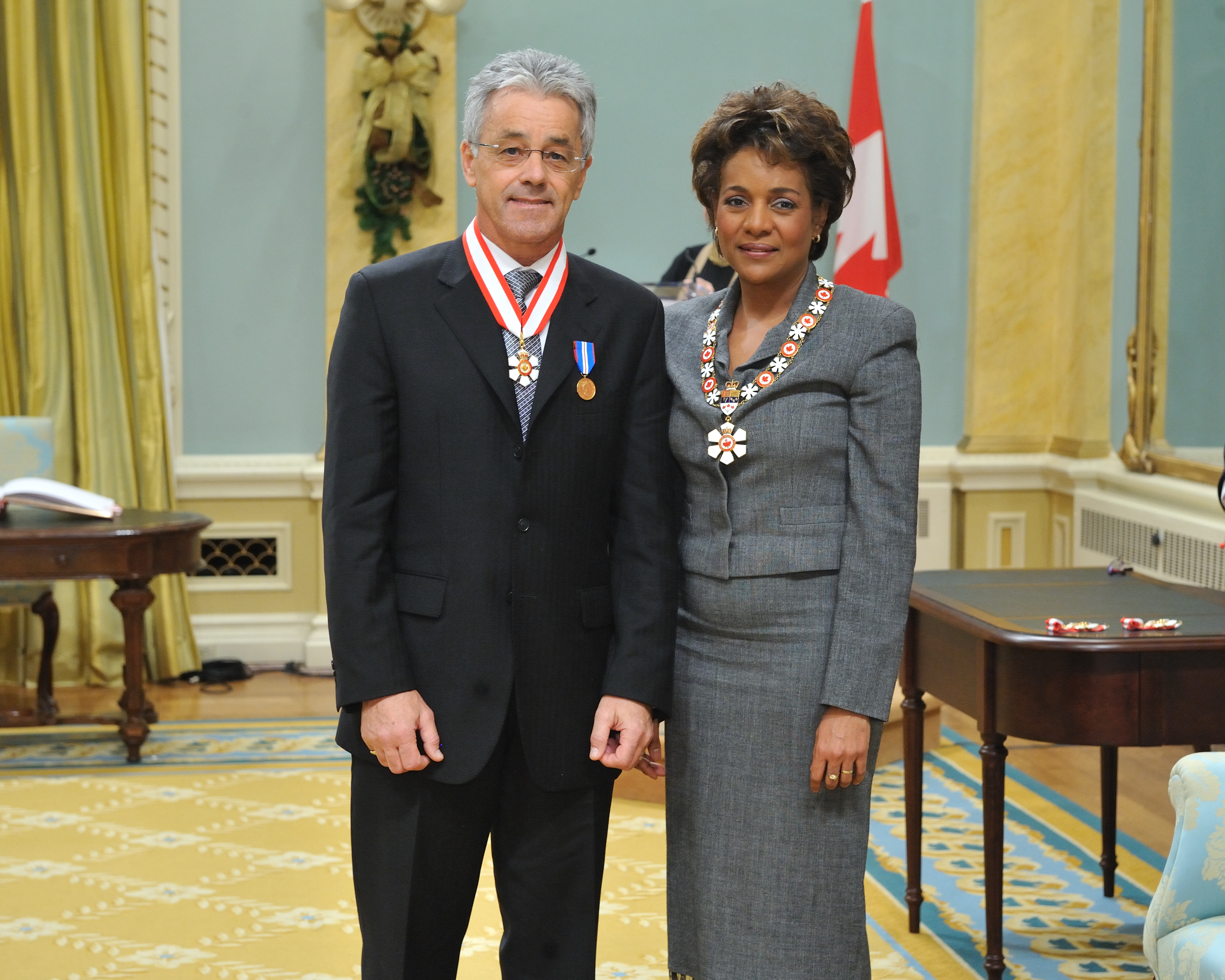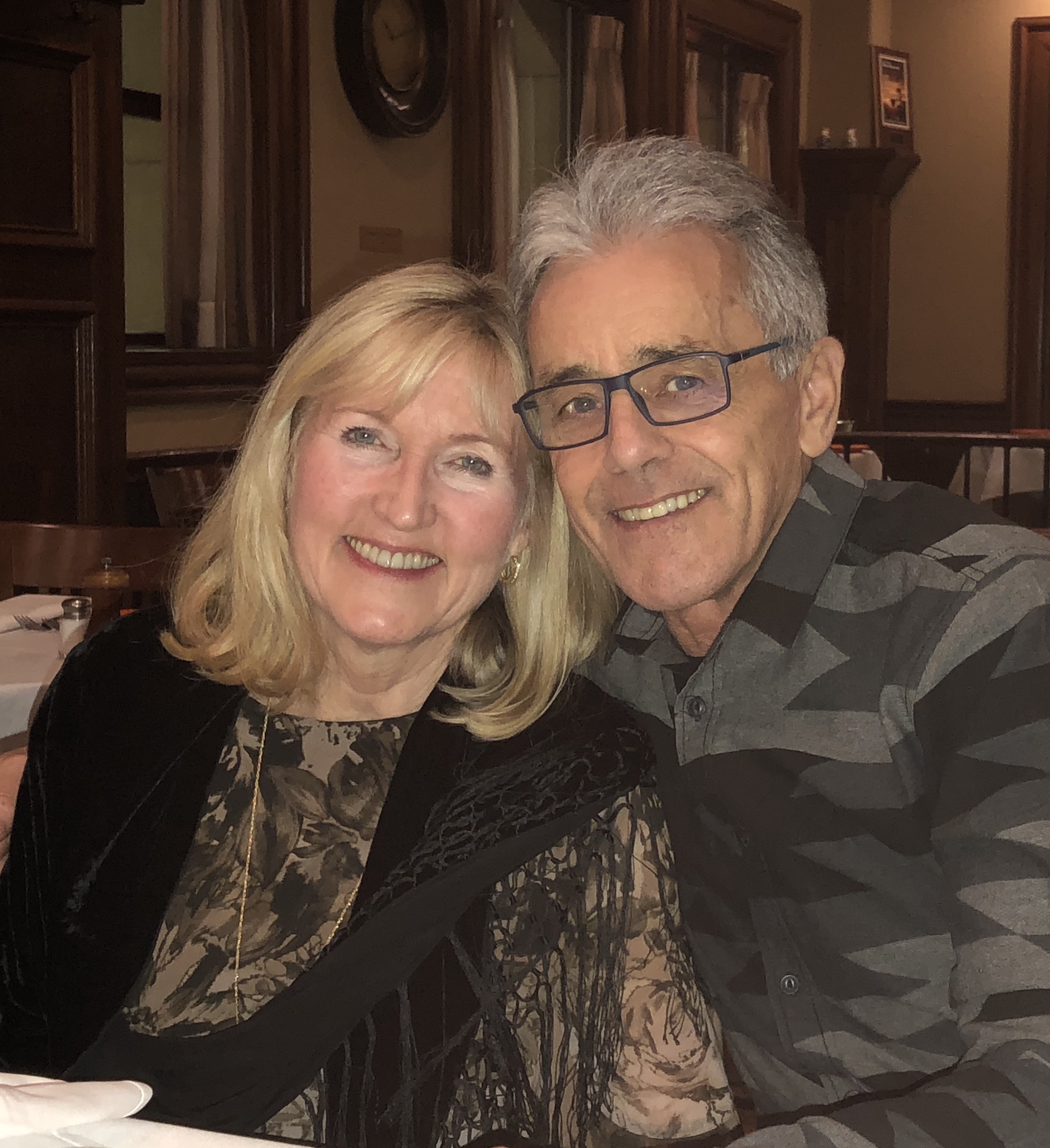Dr. Paul Keown and Dr. James Lan
A closer match could reduce the risk of
rejection and the need for powerful and toxic immune-suppression drugs,
ultimately leading to better outcomes and improved quality of life. The research project just received $5.8 million
in funding from Genome BC, Genome Canada, Michael Smith
Health Research BC, Vancouver Coastal Health Research Institute and
others.

In November 2014, David received the Canadian Armed Forces Medallion of Distinguished Service from the Chief of Defense Staff General Thomas Lawson.
The last 24 years of Dr. David Sweet's prolific life have only been possible through the generosity of two individuals — the deceased donor who gave him a pancreas and kidney, and then a friend and colleague who donated a new kidney when the first one failed.
"Words cannot express thanks and appreciation for these truly amazing gifts of life," says the 71-year old Vancouver man. "I have thrived on my outstanding good fortune and never take the unbelievably generous gifts that I received from my donors for granted."
The transplants allowed the world leading expert in forensic dentistry to catapult his career to the next level, taking on teaching roles across the country and globally, and working internationally with INTERPOL and the Red Cross. In between work and teaching, he also found time to hone his craft as a woodturner.

In addition to a prolific career as a forensic odontologist, David is also a woodturner.
But transplants are not a cure. The toxic drugs David and other transplant recipients must take to prevent rejection of their gifted organs come with many side effects. While David's kidney and pancreas are going strong more than two decades later, he has had two different cancer diagnoses.
"I was not an ideal match with either of my donors so I must continue to take relatively high doses of these drugs, which further creates similar and new complications," says David.
He is hoping a new research project supported by BC Transplant will transform transplant medicine and change things for future recipients. The University of British Columbia (UBC) Dentistry professor emeritus is taking on a new role as patient partner for the ground-breaking study, combining both his personal experience and professional knowledge.
"In my lifetime, for this magnitude of change to happen, it's so exciting," David enthuses. "What an incredible time and we have the potential to really change things."
The Canadian team, led by Dr. Paul Keown, a specialist in immunology and transplant and professor at UBC, Dr. James Lan, a transplant nephrologist and Medical Director of the Immunology Laboratory at Vancouver General Hospital, Dr. Robert Liwski, a Medical Director at Canadian Blood Services and Dalhousie University, and specialists across the country will link transplant experts around the world. The new method to better match donors and kidney recipients will be implemented in Vancouver and extended across Canada, in a world-first program designed to prevent rejection and reduce toxic immune suppression, leading to longer and better quality of life for recipients. The team was recently awarded $5.8 million from Genome BC, Genome Canada, Michael Smith Health Research BC, Vancouver Coastal Health Research Institute and others.
The project will focus on kidneys first and then extend the benefits to patients awaiting other organs. Such patients often don't have the luxury of time to wait for a better match, and the risk of rejection is different for each organ.
"One out of three transplanted kidneys will stop functioning after 10 years, and then it's back to dialysis or another kidney transplant for those patients," explains Dr. Lan. "Half of those failed kidneys are due to rejection. We can all agree this is not optimal, and we have been trying to find a way to revolutionize transplants to overcome this problem since 2010."
Dr. Keown adds, "We think this new way to match organs will be truly transformative. Five or 10 years from now, I believe we will be able to transplant patients safely and successfully, knowing that many of them will keep their new kidney, or eventually their new heart, or new lungs, with minimal immunosuppression for the rest of their life."
A special set of immune molecules called HLA, or human leukocyte antigens, are critically important in transplantation. Our immune system uses these markers to recognize which cells belong in your body and which do not. HLA molecules that are foreign to an individual can provoke a strong immune response, which in transplantation can lead to rejection of the organ. There are more than 30,000 recognized variations of HLA genes, which has made it extremely difficult to match organ donors and recipients using current approaches, preventing long-term success.
The new method of matching donors to recipients compares small sequences called "epitopes", the specific parts of HLA that are recognized by our immune system. Since there are less than 150 epitopes, the complexity of matching is dramatically reduced. This new approach offers the possibility of finding a well-matched donor for the majority of patients on the kidney waitlist.
A better match would end the one-size-fits-all approach to immune suppression, according to Dr. Lan. "If the donor and recipient are well-matched, it's like the early days of transplantation when a twin would donate to their genetically identical twin. There were no immune suppression drugs back then, yet the receiving twin didn't reject their transplanted organ because they were a perfect match. With epitope-matching, this lowers the need for immune suppression because rejection won't be as much of a risk, and with lower doses of drugs, the risks of side effects will be reduced."
The advent of new technology that can perform these tests within the five to six hour window available for matching a donor to recipients has also played a major role in pushing the science to the next level.
"This new approach to rapid high resolution sequencing, led by Dr. Karen Sherwood, Associate Director of the Provincial Transplant Laboratory at VGH, is transforming what we do," says Dr. Keown. "We will start in Vancouver, and within the next year, we hope all HLA laboratories across the country will be using the new nanopore sequencing technology. This would make Canada the first country in the world to achieve the national transfer of such a groundbreaking technology."
David was awarded the Order of Canada in 2008 for his work in forensic odontology, the science of victim identification using dental charts and analysis of teeth and bite marks.

Epitope-matching will mean a big shift in the way waitlists are managed. That's something David Sweet wants to focus on as a patient partner. He waited 18 months for his first transplant, and he knows many others wait a lot longer.
"We have a situation at the moment where I can see the concept of the waitlist actually changing. You have a position on the list, if someone takes that away from you, it feels very unfair," David acknowledges. "It's an exciting moment if we can educate people into recognizing the benefits so they accept the change and can be immersed in a different way of thinking. After all, we have the potential to really change things."
You could say David has always been at the forefront since the beginning of his journey. Originally diagnosed with Type 1 diabetes when he was 10 years old, which led to the secondary issue of chronic kidney disease, his kidney function started to really decline when he was in his early 30s. One of his surgeons Dr. Mark Meloche told David he would actually be a very good candidate for a pancreas-kidney transplant because a new kidney would not address his underlying issue of diabetes which caused kidney failure in the first place, and eventually it would fail too. A pancreas transplant could cure his diabetes.
"This was in 2000 and those were very early days for pancreas transplants in B.C.," recalls David. "I said to Dr. Meloche, 'How can you possibly transplant a pancreas?' The pancreas is basically like a ball of snot?! He said, 'You leave that to me.'"
After his kidney-pancreas, David describes it as "flipping a switch." His health dramatically improved as he was no longer tethered to dialysis and the constant monitoring of his blood sugars. David's career shot to the next level as he was now able to travel internationally and had energy to take on more.
The new kidney started failing a year later because of a viral infection. David couldn't fight off the virus because his immune system was suppressed to prevent rejection. Incredibly, a colleague and friend came forward as a living donor and David received a second kidney transplant in 2004.

David and his wife Chris met in dental school and will celebrate their 46th wedding anniversary next month.
For 23 years, David has taken anti-rejection drugs every single day. They have given him incredible opportunities, but they also led to cancer in his esophagus in 2011, and a different cancer diagnosis just last year.
"If we can get to a point where we can dramatically diminish the amount of immune suppression and the accompanying side effects, or even eliminate immune suppression, wouldn't that be incredible?"
